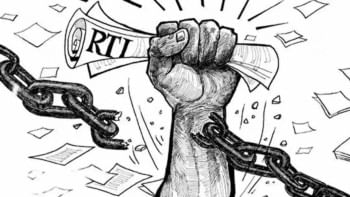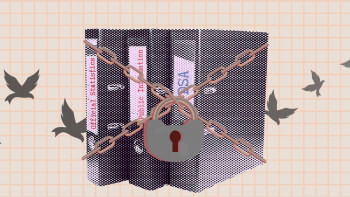Our Information Commission has mettle after all

It has been a regular feature of this column to moan over the slow progress of the Right to Information (RTI) regime in Bangladesh. The excitement witnessed in the early days since the adoption of Right to Information Act, 2009 was soon gone, leaving a few die-hard enthusiasts and NGOs—plus those using the law primarily for personal reasons—to keep the ball rolling. The expectation that our politically conscious citizens would use the law to monitor the government's work never materialised.
We identified two main reasons for this: the lack of sufficient civil society engagement with the law, and the impassive attitude and lack of leadership of the Information Commission of Bangladesh in nudging the law forward. While the former reason persists, there have been some positive developments on the latter front.
In the last few months, we have received some very encouraging feedback from users of the RTI law about the Information Commission's work. The atmosphere at complaint hearings held by the commission is reportedly much less intimidating and more congenial these days. The commission is apparently more inclined to listen to complainants and take a firmer stance against flippant public officials. More importantly, its recent decisions indicate a greater resolve to apply the law more even-handedly.
Wishing to learn more about the use of funds allocated to Dhankora union parishad, in Saturia upazila of Manikganj, under the much-hallowed Local Government Support Project (LGSP), journalist Arup Roy (of Savar upazila) submitted an RTI request to the DO and secretary of the union parishad. He wanted to know how much money was allocated to the union parishad under the project, how much was raised from programmes like Kabikha and Kabita and other local sources, and how they were spent. As he received no response to his request or to his subsequent appeal, Arup complained to the Information Commission.
After a thorough hearing, where the DO was grilled for failing to take action on the RTI request in time, the commission reprimanded him for dereliction of duty, warned him about future lapses and directed him to provide the requested information to Arup within a fixed period. In addition, the DO was fined Tk 3,000 for "causing impediment to the free flow of information." More significantly, the commission also fined Muhammad Abdur Rouf, chairman of said union parishad, an amount of Tk 3,000 for "not being respectful to the law." These are rare impositions of sanctions under the law and are likely to serve as a warning to other recalcitrant public officials.
In another instance, in an RTI request submitted by Hasanuzzaman of Rajshahi to the DO and upazila social welfare officer of Baghmara, the applicant wished to find out how the government programmes for disabled and disadvantaged persons in the upazila were faring. His RTI request included: 1) a list of names, with addresses, of disabled students who received stipends under safety net programmes from education institutions in Bashupara and Goyalkandi unions; 2) a list of names and addresses of burn victims who received loan for relocation under the government's poverty alleviation and economic-social development programme in the same unions; and 3) a list of names and addresses of children and their parents who live at Achinghat Orphanage.
Not receiving any response to his request, Hasanuzzaman submitted an appeal to the District Social Welfare Office, whereupon the assistant director of the office directed the DO of Baghmara to provide the desired information to the applicant. As this too yielded no result, Hasanuzzaman filed a complaint with the Information Commission.
After hearing the parties over two sessions, the commission, peeved by the wilful disregard of duty by the DO, rejected his plea of incapacity due to an accident and chided him for not providing the information before the accident. In its decision, the commission directed the DO to not only provide the information to the complainant within seven days, but to also pay him Tk 1,800 as compensation, as entailed in the RTI Act. This, too, is a rare use of the sanction provisions of the law.
In yet another case, the Information Commission was unhappy with the wanton disregard for the RTI Act by two public officials of the Waqf Office of Bangladesh and decided to impose sanctions on them under the law. Mominul Sarkar, an RTI activist from Taraganj upazila in Rangpur, was concerned with the alleged corruption of officials engaged in administering Waqf property in his upazila. To get to the root of the allegation, he filed an RTI request to the DO of the Waqf inspector's office in Taraganj asking for 1) a copy of the Waqf allocation law; 2) the year of its enactment; and 3) a list of persons allotted upazila Waqf land.
Not receiving a response, Mominul filed an appeal to the Waqf administrator in Dhaka, in reply to which the assistant administrator of the office informed Mominul that the information requested could not be provided as it was not preserved. Mominul filed a complaint with the Information Commission.
Two virtual hearings took place, in the first of which the complainant claimed that he was not only denied the information but also harassed by the DO for seeking it. At the second hearing, the complainant admitted having received some information subsequently, but only partially. In response, the DO again claimed that the remaining information was not preserved in his office.
Not being satisfied with this, the commission directed the DO to find the remaining information and provide it to the complainant within a given period. It further directed departmental disciplinary action against the DO under the RTI Act for refusing to receive Mominul's application initially. The commission further directed the Waqf administrator to take departmental disciplinary action against the assistant administrator who had responded to the appeal without any legal authority and without a hearing. This is indeed a proper application of the law.
The Information Commission of Bangladesh deserves to be commended for the objectivity it has demonstrated in its most recent decisions. Its reputation suffered over the years in the eyes of RTI users due to its alleged unfriendly treatment of complainants and lack of firmness towards derelict public officials. This is likely to change now.
Let us conclude with some statistics to illustrate the situation. While in 2022 only six sanctions of various sorts were imposed by the Information Commission on defaulting public officials under the RTI Act (and none in the first six months of 2023), in the months that followed, seven sanctions have been imposed. This will certainly send a stern message to public officials who fail to fulfil their responsibilities under the RTI Act, and will encourage civil society members to use the law more as a duty than as a right to monitor the work of the government.
Shamsul Bari and Ruhi Naz are chairman and assistant director (RTI), respectively, of Research Initiatives, Bangladesh (RIB). They can be reached at [email protected].


 For all latest news, follow The Daily Star's Google News channel.
For all latest news, follow The Daily Star's Google News channel. 












Comments